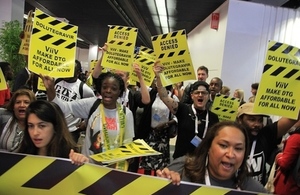UK aid raises the voices of grassroots HIV organisations
DFID steps up support for global community networks working with people with HIV to realise their human rights, tackle stigma, and advocate for policy change.

Picture: Robert Carr Fund
The UK has today (Wednesday 25 July) committed to increase its support to help people in grassroots organisations keep HIV on the agenda in countries around the world.
International Development Minister Alistair Burt made the announcement at the International AIDS Conference in Amsterdam, also attended by HRH Duke of Sussex and Sir Elton John.
He pledged that DFID will step up its support for the Robert Carr Fund - an organisation dedicated to supporting community networks across the world which help people with HIV to realise their human rights, tackle stigma, and advocate for policy change.
International Development Minister Alistair Burt said:
People affected by HIV should be able to live without fear of stigma and discrimination. That’s why it’s important that through UK aid we continue to support vulnerable people to access the HIV prevention and treatment services that they have a right to.
The UK is already the second largest funder of HIV prevention, treatment and care in the world. UK aid is preventing people from being infected, providing lifesaving support for those living with HIV, improving access to medicines and leading innovative research.
The work of the Robert Carr Fund and civil society networks mean that people with HIV get access to the health services that they need and live without fear of stigma and discrimination.
The investment from DFID will support the following groups who are most vulnerable to HIV infection - men who have sex with men, people who use drugs, prisoners, sex workers and transgender people, among others - in the Middle East, Sub-Saharan Africa, Asia and the Caribbean.
Projects and campaigns supported by the Fund include:
-
The ‘Gay Star News Digital Pride’ project empowers LGBT voices across the Middle East and North Africa to celebrate Pride online in a safe environment.
-
AMSHeR supported workshops to campaign for human rights when people with HIV were arrested in Tanzania. This group also developed an African Key Populations Scorecard; this is an index to hold governments to account for their performance, against global guidance, for people living with HIV.
Notes to Editors
-
The UK government is the second largest donor to the global AIDS response and to the Global Fund to fight AIDS, TB and Malaria.
-
This £6million announcement brings the DFID’s support to the Robert Carr fund to £15million up to 2021. In 2016 globally 19.5 million of the 36.7 million people living with HIV had access to treatment – up from 5.2 million people on treatment in 2010.
-
Around 76% of pregnant women living with HIV have access to antiretroviral medicines up from 47% in 2010.
-
New HIV infections among children have halved.
There is more to do:
-
In 2016 AIDS killed over 1 million people.
-
AIDS remains the biggest killer of women of reproductive age (15-49) worldwide.
-
Although more people are on treatment, we are not having the same success in bringing new infection rates down.
-
Globally, in 2016 nearly 2m adults per year were infected with HIV, with no statistically significant drop in new infections in adults since 2008.
UK spend on HIV:
-
DFID is the second largest international funder of the HIV response behind the US, spending £1.56 billion.
-
Our investments are through multilateral organisations such as the Global Fund to fight AIDS, TB and Malaria, UNAIDS and Unitaid given their greater reach and scale. These are key players in the global response on HIV. The UK sits on the boards of all three organisations.
General media queries (24 hours)
Email mediateam@dfid.gov.uk
Telephone 020 7023 0600
If you have an urgent media query, please email the DFID Media Team on mediateam@dfid.gov.uk in the first instance and we will respond as soon as possible.